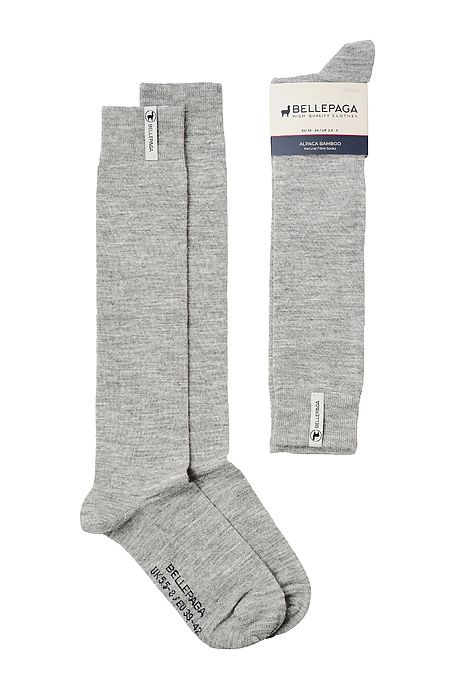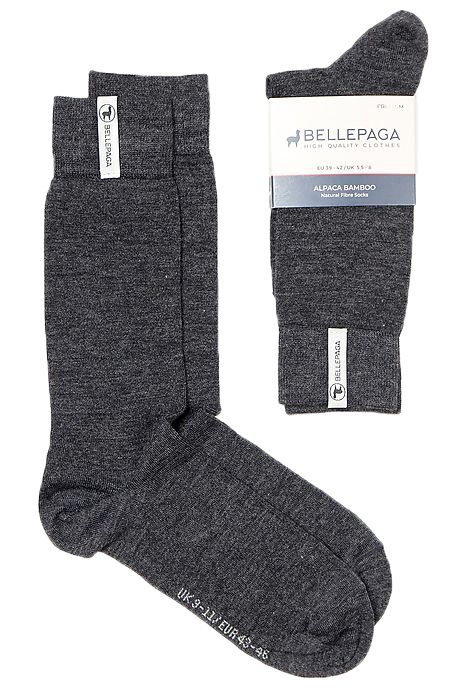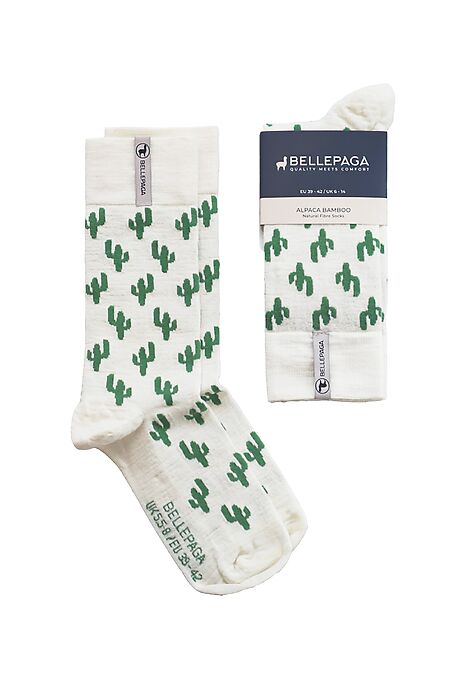Extra Warm Socks
Comfort and Warmth for Winter
When winter sets in and temperatures drop, keeping your feet warm becomes a priority. Indeed, warm feet are synonymous with comfort and well-being, especially when you have to face freezing days. That's why it's essential to choose the right socks that provide optimum thermal insulation. A very warm sock is the essential accessory for protecting your feet from the biting cold. Different materials offer different properties in terms of warmth, comfort and durability. Among these materials, alpaca wool, merino wool, cashmere and bamboo stand out for their unique advantages. Each material provides a different solution for keeping your feet warm while ensuring maximum comfort. Let's explore these four options together to help you make the best choice for your winter socks, combining warmth, softness and practicality.
1 - Alpaca Wool: Natural Warmth and Softness
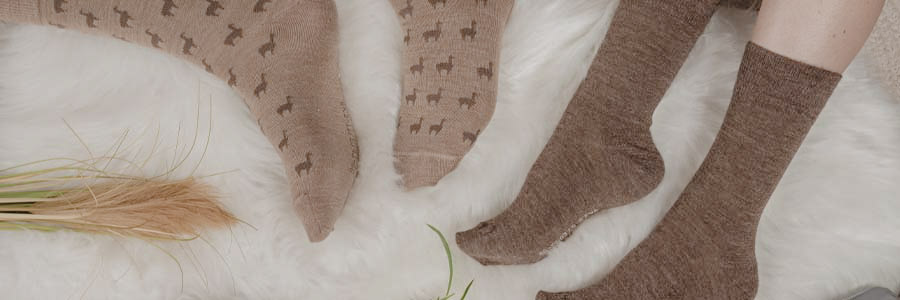
When it comes to choosing a very warm sock, alpaca wool is the material of choice. Native to the Andes, alpaca produces an exceptionally soft and insulating fibre, making it an ideal option for winter clothing, especially socks.
Alpaca wool is renowned for its remarkable thermal properties. It is naturally insulating, able to retain heat even in extreme weather conditions. Alpaca fibres are hollow, which creates an effective thermal barrier around your feet, keeping them warm all day long. What's more, alpaca wool is lightweight and breathable, so you won't feel suffocated or overly damp.
As well as its insulating properties, alpaca wool is also hypoallergenic. Unlike traditional wool, it does not contain lanolin, a substance often responsible for skin irritations. This makes it a perfect option for people with sensitive skin or allergies. As well as providing comforting warmth, a very warm alpaca wool sock offers unrivalled softness, ensuring maximum comfort all day long.
Alpaca wool socks are also durable. The fibres are hard-wearing and retain their shape over time. With proper care, a pair of alpaca socks can last several winters, offering excellent value for money. What's more, alpaca is a naturally odour-resistant fibre, which helps maintain a pleasant freshness even after a long day's wear.
2 - Merino Wool: Lightweight, High-Performance Warmth
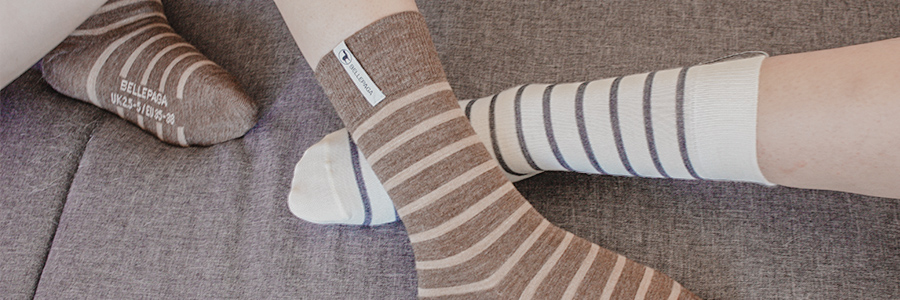
Merino wool is another exceptional material for those looking for a very warm sock. Originating from Merino sheep, this wool is famous for its fineness, softness and heat-regulating properties. These characteristics make it a popular option not only for socks, but also for a variety of performance garments.
One of the main reasons why merino wool is so popular is its ability to regulate body temperature. Merino fibres are extremely fine and create a multitude of tiny air pockets that retain heat when it's cold, while allowing the skin to breathe and wicking away moisture when it's hot. This means your feet stay at a comfortable temperature all day long, no matter how strenuous your activities. A very warm merino wool sock is therefore ideal for outdoor adventures, winter sports or simply for everyday use in cold weather.
Merino wool is also naturally elastic and durable. It resists wear well, which means your socks will retain their shape and comfort over time. What's more, this wool has natural antibacterial properties, reducing odours even after prolonged use. This is particularly beneficial for those with active lifestyles who don't want to worry about changing their socks several times a day.
In terms of comfort, merino wool is one of the softest available. Unlike some wools that can cause itching, merino fibres are very fine and soft against the skin. This makes merino wool socks comfortable to wear directly against the skin, without the need for a lining. For those looking to combine performance and comfort, a very warm merino wool sock is an ideal solution.
3 Cashmere: Luxury and unrivalled warmth
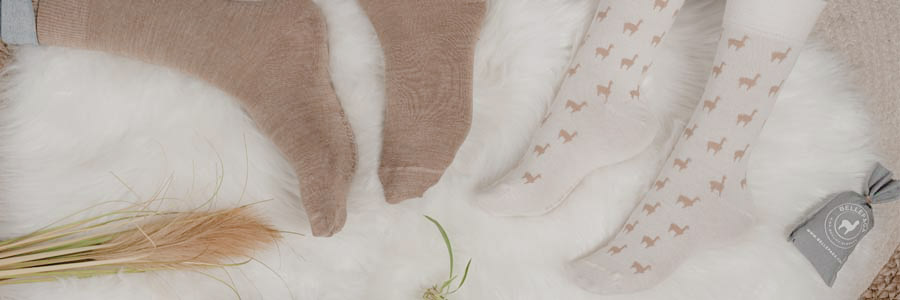
Cashmere is another material of choice for those looking for an extra warm sock. Known for its softness and luxury, cashmere is a natural fibre derived from cashmere goats. This premium material is valued not only for its warmth, but also for its exceptional comfort, making it a popular choice for winter clothing, including socks.
One of the most remarkable features of cashmere is its ability to provide exceptional warmth without adding bulk. Cashmere fibres are incredibly fine and light, making it possible to produce socks that are both warm and comfortable to wear. By opting for an extra warm cashmere sock, you'll benefit from effective thermal insulation while still feeling light on your feet. This makes it an ideal choice for those looking for both warmth and elegance.
Cashmere is also extremely soft to the touch, making it a great choice for people with sensitive skin. Unlike some wools that can cause itching or irritation, cashmere is delicate and pleasant against the skin. This incomparable softness means you can wear cashmere socks all day without feeling any discomfort, even directly on bare skin. For optimum comfort, a very warm cashmere sock is hard to beat.
In terms of durability, cashmere requires special care to maintain its quality. We recommend washing cashmere socks by hand or machine in cold water, and drying them flat to avoid warping. Despite these precautions, cashmere remains a robust material that can last a long time if properly cared for. Investing in cashmere socks means opting for a combination of luxury, warmth and longevity.
Cashmere also has an elegant, timeless look. Cashmere socks are available in a variety of colours and styles, so you can easily match them to your winter outfits. Whether for a special occasion or everyday wear, a warm cashmere sock adds a touch of sophistication to your winter wardrobe.
4.bamboo: an eco-friendly and comfortable option
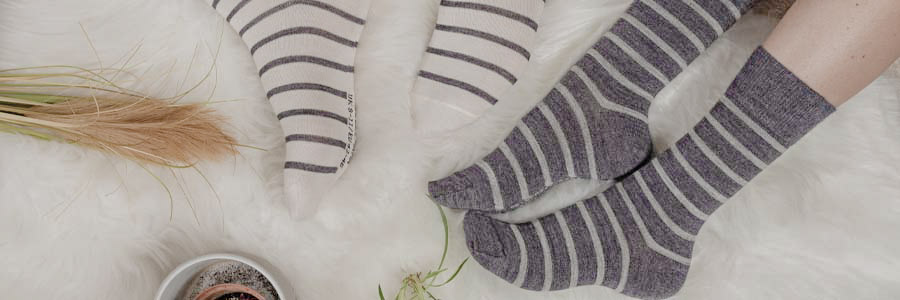
When you think of the materials used for extra warm socks, bamboo doesn't immediately spring to mind. Yet it's an increasingly popular option, not least because of its eco-friendly properties and exceptional comfort.
Bamboo is a renewable resource that grows rapidly without the need for pesticides or fertilisers. This rapid, sustainable growth makes bamboo an environmentally friendly choice. What's more, the production of bamboo fibres uses less water than other textile materials, making it an eco-responsible option for consumers concerned about the environmental impact of their clothing.
In terms of comfort, bamboo socks are particularly appreciated for their softness. Bamboo fibre is naturally smooth and round, which reduces the risk of irritation and chafing. For those with sensitive skin or allergies, bamboo is an excellent alternative to more common fibres.
Bamboo socks are also known for their ability to regulate temperature. Although bamboo is best known for its cooling properties in summer, it is also effective at maintaining warmth in winter. Bamboo fibres have micro-perforations that allow excellent air circulation while retaining body heat. This makes it ideal for very warm socks in cold climates.
Another advantage of bamboo socks is their ability to wick away moisture. Bamboo is naturally absorbent, keeping feet dry by absorbing perspiration. This is particularly useful in winter, when feet can sweat from hot shoes, causing discomfort and chills. Dry feet mean warm feet, and bamboo excels in this area.
What's more, bamboo has natural antibacterial properties. This helps to reduce unpleasant odours and maintain optimum hygiene throughout the day. This antibacterial property is an added bonus for those looking to invest in extra warm socks that stay cool and comfortable for a long time.
Conclusion
In conclusion, choosing the right material for an extra warm sock is essential if you want to face the rigours of winter in comfort and style. Whether you opt for the insulating warmth of merino wool, the lightness and softness of cashmere, the robustness and thermoregulation of bamboo, or the exceptional warmth and durability of alpaca wool, each material offers unique benefits. Extra-warm merino wool socks stand out for their ability to regulate temperature and wick away moisture, while cashmere provides unrivalled luxury.
Bamboo, meanwhile, offers an eco-friendly alternative with its natural antibacterial properties. Finally, alpaca wool combines extreme warmth and comfort, as well as being hypoallergenic. Investing in socks made from these high-quality materials not only ensures warm feet all winter long, but also long-lasting comfort and timeless elegance. Ultimately, choosing the right material for your socks depends on your specific needs and personal preferences, ensuring that you're well-equipped to face the coldest days of the year.
Bamboo, meanwhile, offers an eco-friendly alternative with its natural antibacterial properties. Finally, alpaca wool combines extreme warmth and comfort, as well as being hypoallergenic. Investing in socks made from these high-quality materials not only ensures warm feet all winter long, but also long-lasting comfort and timeless elegance. Ultimately, choosing the right material for your socks depends on your specific needs and personal preferences, ensuring that you're well-equipped to face the coldest days of the year.
-
Socks Sami Premium - High
- 35 - 38
- 39 - 42
- 43 - 46
35,90 €
-
Sami Premium Socks - Classic
- 35 - 38
- 39 - 42
- 43 - 46
29,90 €
-
Socks Sami Premium - High
- 35 - 38
- 39 - 42
- 43 - 46
39,90 €
-
Kachi socks
- 35 - 38
- 39 - 42
- 43 - 46
23,90 €


